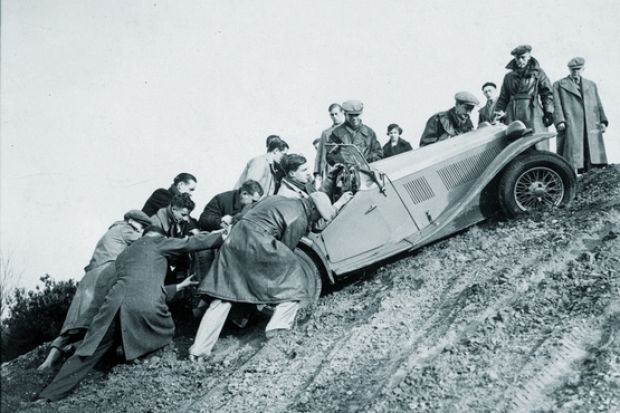Source: Getty
Grade point turn: the HEA has been tasked with brokering a UK-wide debate on the alternative marking model
A “national debate” about replacing the UK’s honours degree classifications with US-style grade-point averages is under way as plans by a group of universities to introduce the GPA model struggle to gain momentum.
The first high-profile push to introduce GPA in the UK came in 2011 from a group mainly made up of Russell Group universities, but progress since then has been slow.
University College London had hoped to launch a pilot in 2012-13 with a view to adopting the GPA system this autumn. However, Anthony Smith, UCL’s vice-provost for education, told Times Higher Education that the pilot is now unlikely to run before 2014-15.
Paul White, pro vice-chancellor for education at the University of Sheffield, who took over from UCL’s Michael Worton as head of the informal GPA working group in January last year, said that its members had been busy modelling how UK marking schemes would map on to a GPA system.
But it had become clear that rather than a conversion exercise, adopting GPA would require a rethink of assessment and extensive training for staff.
“We’re looking two to three years down the line if we want a fully worked- out system introduced in a robust fashion,” he added.
Last month, Oxford Brookes University announced its own plans to introduce a GPA system alongside honours degrees.
However, Professor White said that the way the institution had gone it alone was “not generally thought to be helpful” by the group. He added that Oxford Brookes’ leaders “haven’t gone all the way. They’re doing a conversion job from the classification system, and haven’t trained staff in using a different structure. In a sense they’ve jumped the gun.”
Let’s talk it over
Meanwhile, David Willetts, the universities and science minister, has asked the Higher Education Academy to broker a “national debate” on the system and whether it should be developed across the UK.
Benefits of the GPA system - which calculates an average of student scores, usually marked on a scale from zero to 4.0 - are thought to include eliminating the “cliff edge” of degree classifications, encouraging students to work throughout their degrees and increasing international recognition.
The consultation was set up after a round-table event in December where Mr Willetts discussed developments with the GPA working group, the HEA and Sir Robert Burgess, the University of Leicester’s vice-chancellor.
Sir Robert is the driver behind the Higher Education Achievement Report, a different plan to introduce a complementary system (and potentially a long-term alternative) to honours degrees.
As well as formally consulting the sector, the HEA will include employers, professional bodies, international organisations and the National Union of Students in the GPA discussions, said Craig Mahoney, its chief executive.
Professor Mahoney said he hoped to be in a position to report initial findings back to the government by August, when he leaves the HEA to become principal of the University of the West of Scotland.
“The ultimate intention of this, if it were a success…is to replace classified degrees with a more meaningful outcome from universities for students to be able to use as their licence into the workforce,” he added.
A UK GPA system has taken so long to develop, despite the system being well established abroad, because marking patterns here are “quite different” from elsewhere in the world, Professor White argued.
Unlike in the US, where grading is more closely tied to fulfilling set criteria and students tend to be able to achieve maximum scores, in the UK the distribution of marks tends to cluster around an average, with few achieving very high or very low marks.
UCL has spent the past year analysing historical data to see whether any particular student’s outcomes would have been radically affected by GPA, Professor Smith said.
Meanwhile, the universities of Birmingham and Nottingham have been modelling how to map both quantitative subjects, which are more likely to use the full range of scores out of 100, and qualitative subjects on to the same system.
The “folklore” is that this will be difficult, Professor Smith added. “That’s what the anxiety is. We just have to go through the modelling and I think we will [dispel] these myths.”
Register to continue
Why register?
- Registration is free and only takes a moment
- Once registered, you can read 3 articles a month
- Sign up for our newsletter
Subscribe
Or subscribe for unlimited access to:
- Unlimited access to news, views, insights & reviews
- Digital editions
- Digital access to THE’s university and college rankings analysis
Already registered or a current subscriber? Login




